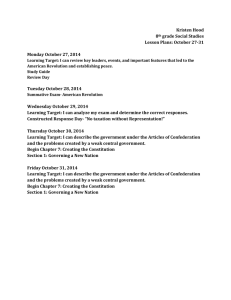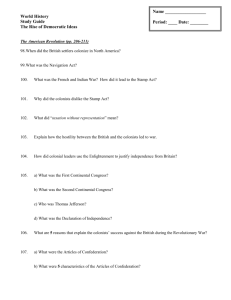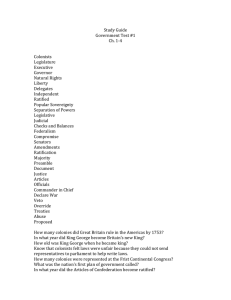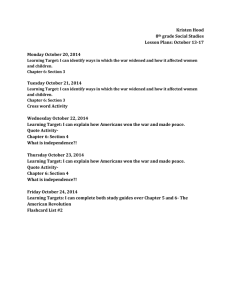US History Name_______________________________ Creating a Nation
advertisement
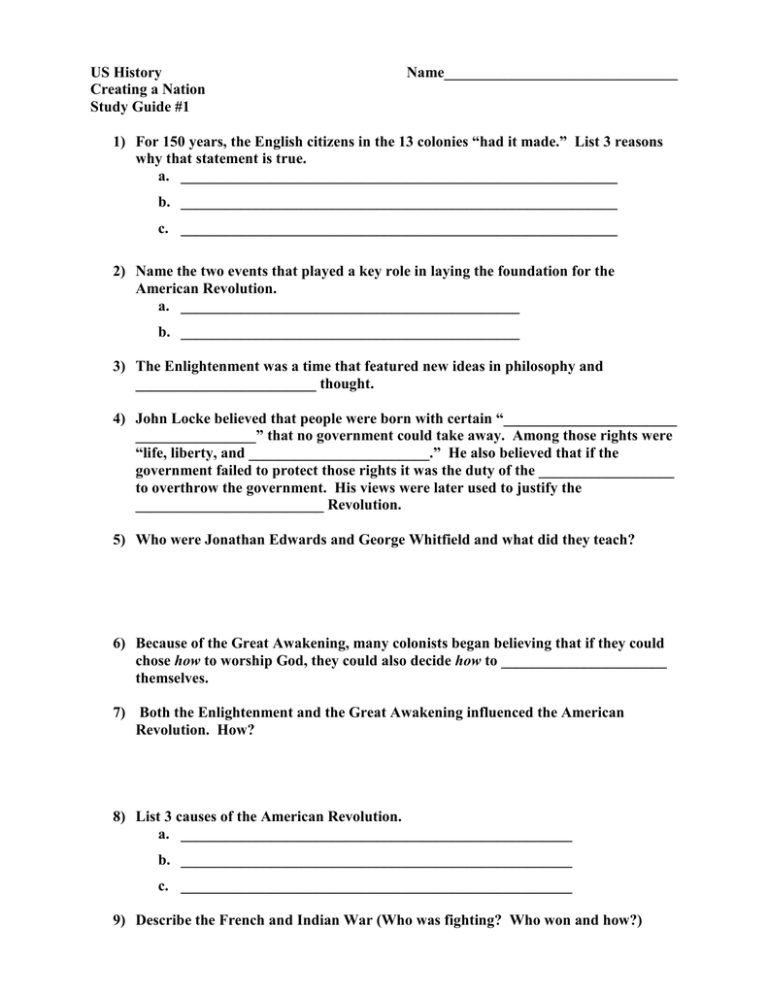
US History Creating a Nation Study Guide #1 Name_______________________________ 1) For 150 years, the English citizens in the 13 colonies “had it made.” List 3 reasons why that statement is true. a. __________________________________________________________ b. __________________________________________________________ c. __________________________________________________________ 2) Name the two events that played a key role in laying the foundation for the American Revolution. a. _____________________________________________ b. _____________________________________________ 3) The Enlightenment was a time that featured new ideas in philosophy and ________________________ thought. 4) John Locke believed that people were born with certain “_______________________ ________________” that no government could take away. Among those rights were “life, liberty, and ________________________.” He also believed that if the government failed to protect those rights it was the duty of the __________________ to overthrow the government. His views were later used to justify the _________________________ Revolution. 5) Who were Jonathan Edwards and George Whitfield and what did they teach? 6) Because of the Great Awakening, many colonists began believing that if they could chose how to worship God, they could also decide how to ______________________ themselves. 7) Both the Enlightenment and the Great Awakening influenced the American Revolution. How? 8) List 3 causes of the American Revolution. a. ____________________________________________________ b. ____________________________________________________ c. ____________________________________________________ 9) Describe the French and Indian War (Who was fighting? Who won and how?) 10) When the French and Indian War ended, what problem did that pose to the British? How did they deal with that situation? 11) What was the Proclamation of 1763? Your notes say that “this angered the colonists.” Why do you think that’s true? 12) Following the French and Indian War, new taxes were imposed by the British on the colonists. Identify the following: a. ___________________________________: a tax on imported sugar and other goods from England b. ___________________________________: a tax on all legal documents; colonists responded by forming the “Sons of Liberty” and the “Daughters of Liberty” to protest c. ___________________________________: a tax on a number of imported items, including tea; colonists boycotted those goods; act was repealed after the Boston Massacre except for the tax on tea (led to the Boston Tea Party) d. ___________________________________: a set of laws passed in response to the Boston Tea Party; included closing the Boston Harbor and placing a military governor over Massachusetts 13) In response to the Intolerable Acts, representatives gathered for the First __________________________________________. This body agreed to do what two things? a. __________________________________________________________________ __________________________________________________________________ b. __________________________________________________________________ __________________________________________________________________ 14) England responded to the First Continental Congress’s actions by sending even more troops to America, especially the city of ________________________. 15) Describe the Battles of Lexington and Concord (Who? What? When? Where? Why?) 16) Less than a month after the Revolutionary War began at Lexington, delegates met again for the Second ______________________________________________________ to discuss what to do next. Some people, called “_____________________________” wanted a war for independence. Others, called “_____________________________” wanted to compromise with the British to prevent war. Ultimately, the Second Continental Congress decided to do what two things? a. __________________________________________________________________ b. __________________________________________________________________ 17) What was England’s and King George’s response to the Second Continental Congress? 18) Why was Thomas Paine significant in rallying support for revolution? 19) The Declaration of Independence, signed on _______________________ (date), was drafted, or written, mainly by _______________________________________ (who?) and signed by 56 delegates. It listed all of the wrongs committed by England and __________________________________. Jefferson was influenced by ______________________________ (who?) in stating that “all men are created equal” and have certain “inalienable rights” (natural rights). Over time, this document served as a ______________________ for other nations seeking independence. 20) Why did King George III not expect a long war? 21) What were two major advantages the colonists had? a. _________________________________________________________________ b. _________________________________________________________________ 22) The British made several military ________________________ during the course of the war because they underestimated the Patriots. 23) A major turning point in the war occurred in ___________________________, NY. With a victory there, the _________________________ were convinced to ally themselves with the colonists. 24) After years of fighting, the war came to an end at _________________________, VA. British General Lord ______________________________ had retreated to the coastline to wait for British supply ships. Since Yorktown is on a peninsula, the British troops were trapped. _____________________ ships blocked off the British supply ships. General ____________________________ moved in on Yorktown and trapped the British Army. Cornwallis was forced to surrender and the war basically came to an end. 25) The American Revolution officially ended with the signing of the __________________________________ (1783). This treaty made the US an independent country and established the border between the US and _______________________. US History Creating a Nation Study Guide #2 Name_______________________________ 1) What was the first national government or constitution called? 2) Why did the Articles of Confederation ultimately fail? 3) Name 5 of the 8 weaknesses of the Articles of Confederation. a._______________________________________________________________ b._______________________________________________________________ c._______________________________________________________________ d._______________________________________________________________ e._______________________________________________________________ 4) Daniel Shays led a rebellion against _____________________ imposed by the state of Massachusetts. Because the national government had very little power, the state of Massachusetts was forced to deal with the situation on its own. What did this rebellion reveal about the Articles of Confederation? 5) What was the original purpose of the Constitutional Convention? 6) Who was chosen as the President of the Convention? 7) Who is often called the “Father of the Constitution”? Why is he called that? 8) The Great Compromise solved the issue of ___________________________ in Congress. Large states wanted the number of representatives each state received to be based solely on ______________________________ (Virginia Plan). Small states wanted each state to receive an ________________________ number of representatives (New Jersey Plan). The two sides compromised by creating __________ houses of Congress: one house based on population, one house would have equal representation. 9) The Three-Fifths Compromise solved the issue of whether or not to count ____________________ to determine how many representatives each state received in the House of Representatives. ________________________ did not want to include slaves to determine the number of representatives, while ______________________ did want to include slaves. What did the two sides agree to do? 10) Those who favored a strong national government and favored the passage of the new Constitution were called _____________________________. 11) Those who opposed a strong national government and opposed ratifying the new Constitution were called _________________________________. 12) What were the Federalists Papers and who were the writers? 13) Why did some states refused to ratify, or approve, the new Constitution as it was originally presented? What did delegates agree to do at a later date? 14) The first 10 amendments to the US Constitution are collectively called the ______________________________________. 15) There are seven so-called “Principles of the Constitution.” Identify the following: a. _______________________________________: citizens elect representatives to government to make laws b. _______________________________________: the federal government and the state governments share power c. _______________________________________: each branch of government has the power to limit the actions of the other two branches d. _______________________________________: the government’s power is divided among three branches of government; legislative, judicial, executive e. _______________________________________: people are the main source of the government’s authority f. _______________________________________: the Constitution protects citizens’ individual rights, such as freedom of speech and religion g. _______________________________________: the government has only the powers that the Constitution gives it 16) What was Alexander Hamilton’s controversial economic plan to deal with the nation’s debt? a. __________________________________________________ b. __________________________________________________ c. __________________________________________________ 17) Why did most Southerners oppose Hamilton’s plan? 18) Describe the Whiskey Rebellion of 1794. (Why did it occur? What happened? What did it show?) 19) What were President Washington’s three key points in his farewell address to the nation? a. __________________________________________________________________ b. __________________________________________________________________ c. __________________________________________________________________ 20) Despite Washington’s warnings, opposing political parties did emerge in the US. What did these first two political parties believe in? a. Federalist Party b. Democratic-Republican Party 21) The US Supreme Court case Marbury v. Madison established the power of judicial review, which means what? 22) What did the Mississippi Territory include? 23) What did the Treaty of Greenville allow the U.S. to claim? 24) The Northwest Ordinance did two things. What were they? a. b. 25) Describe the Louisiana Purchase. (who, what, when, where, how) 26) This man explored the Rocky Mountains shortly after the Lewis and Clark Expedition. ___________________________________ 27) What caused the War of 1812? 28) Identify: a. Francis Scott Key b. Andrew Jackson c. Treaty of Ghent 29) List 4 results of the War of 1812. 30) What did the Adams-Onis Treaty do? 31) Describe the Monroe Doctrine. 32) The “Age of Jackson” was characterized by what? 33) Describe the Indian Removal Act and the Trail of Tears.
